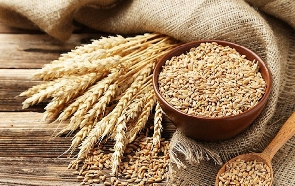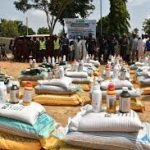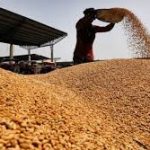The Federal Ministry of Agriculture and Food Security has taken significant steps to enhance wheat production in Nigeria by distributing farming inputs to 2,000 farmers in Niger State for the 2024/2025 dry season farming. This effort is part of the National Agricultural Growth Scheme and Agro-Pocket (NAGS-AP).
At the distribution event held in Garafini and Swashi communities in Borgu, Ishaku Buba, the National Project Officer for NAGS-AP, represented by Musaku Emmanuel, highlighted the initiative’s importance. He disclosed that 2,000 hectares of land had been allocated for wheat cultivation, using advanced mechanized farming methods to improve productivity.
“This initiative aims to make Nigeria self-sufficient in wheat production while improving the living conditions of farmers in these communities,” Buba stated. He emphasized that the scheme is a collaborative effort between the Federal Government and private sector partners, including SMK Nigeria Limited, which supplied NPK and Urea fertilizers as well as certified and improved wheat seeds.
Farmers in the region expressed optimism about the initiative’s potential. Adamu Jibril, the district head of Garafini and a wheat farmer, praised the Federal Government’s efforts, noting the scheme’s potential to improve livelihoods and build a sustainable agricultural economy.
“This initiative will uplift my subjects by creating a sustainable economy through improved wheat farming,” Jibril said.
Local farmer Samaila Ismail shared how modern techniques introduced through the scheme had transformed farming practices. “We have moved from peasant farming to mechanized farming, using tractors and planters, which has significantly enhanced our productivity. Previously, we harvested only half a tonne of wheat per hectare, but now we can achieve three tonnes, equivalent to 30 bags of wheat,” he said.
Ismail also expressed hope that Nigeria would soon stop relying on wheat imports, thanks to the increased productivity fostered by the scheme. “The support we have received will encourage more farmers to embrace wheat farming and contribute to making wheat importation a thing of the past,” he added.
The initiative aligns with the Federal Government’s broader efforts to address the shortfall in domestic wheat production and reduce the country’s dependence on costly imports. By equipping farmers with modern tools, fertilizers, and improved seeds, the NAGS-AP scheme seeks to foster self-reliance and ensure food security.
As more farmers adopt mechanized farming methods under the scheme, the prospects for wheat production in Nigeria are looking brighter, with benefits expected to ripple through rural communities and the national economy alike.










